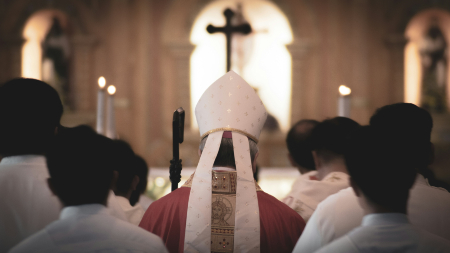We ask you, urgently: don't scroll past this
Dear readers, Catholic Online was de-platformed by Shopify for our pro-life beliefs. They shut down our Catholic Online, Catholic Online School, Prayer Candles, and Catholic Online Learning Resources essential faith tools serving over 1.4 million students and millions of families worldwide. Our founders, now in their 70's, just gave their entire life savings to protect this mission. But fewer than 2% of readers donate. If everyone gave just $5, the cost of a coffee, we could rebuild stronger and keep Catholic education free for all. Stand with us in faith. Thank you.Help Now >
'Dignitas Infinita' Lists 'Grave Violations of Human Dignity'
FREE Catholic Classes
The Dicastery for the Doctrine of the Faith published 'Dignitas Infinita', marking the culmination of five years of meticulous work. This groundbreaking declaration builds upon the rich tapestry of the papal magisterium over the past decade, delving into multifaceted issues ranging from war and poverty to gender theory and digital violence. The document lists the grave violations of human dignity. It should be noted that grave sins are mortal sins, and those who engage in these behaviors are placing themselves outside of salvation if the conditions of mortal sin are met and genuine repentance does not occur.

Photo credit: Jomarc Nicolai Cala
Highlights
4/8/2024 (1 year ago)
Published in Living Faith
Keywords: Dicastery for the Doctrine of the Faith, Dignitas Infinita, Human Dignity, Papal Magisterium, Bioethics, Social Justice
Authored by Andrea Tornielli, the document is structured into three foundational chapters leading to a fourth, which meticulously examines various grave violations of human dignity. Commemorating the 75th anniversary of the Universal Declaration of Human Rights, 'Dignitas Infinita' reaffirms the intrinsic dignity of every human person within Christian anthropology.
The document's significance lies in its holistic approach, encompassing not only bioethical concerns but also addressing social injustices such as poverty, violence against women, and human trafficking. By presenting a non-exhaustive list of violations, including abortion, euthanasia, war, and slavery, the declaration bridges the gap between beginning-and-end-of-life issues and broader assaults on human dignity.
Of particular note is the document's discussion of gender theory. The discourse on gender theory within the document emphasizes the imperative to evade "every sign of unjust discrimination" against homosexual individuals, stressing that "particularly any form of aggression and violence" must be meticulously avoided.
Highlighting the stark contradiction with human dignity, the Declaration voices concern that in certain regions, individuals are unjustly subjected to imprisonment, torture, and deprivation of basic rights solely due to their sexual orientation.
Criticism is directed towards gender theory, deemed "extremely dangerous since it cancels differences in its claim to make everyone equal". It explains, "Human life in all its dimensions, both physical and spiritual, is a gift from God. This gift is to be accepted with gratitude and placed at the service of the good. Desiring a personal self-determination, as gender theory prescribes ... amounts to a concession to the age-old temptation to make oneself God."
Gender theory's purported aim to negate the fundamental difference between individuals based on their sexes is highlighted, with the document asserting that "all attempts to obscure reference to the ineliminable sexual difference between man and woman" are unequivocally rejected."
At its core, 'Dignitas Infinita' underscores the ontological dignity of the human person, irrespective of cultural shifts or living conditions. It vehemently rejects any notion that limits dignity to rational capabilities, asserting the intrinsic worth of every individual from conception to natural death.
Moreover, the document confronts the misuse of human dignity to justify arbitrary expansions of rights, emphasizing the need to safeguard dignity beyond subjective desires. It denounces various forms of violence, including physical, mental, and digital, urging a collective commitment to uphold the sanctity of human life.
Among the array of violations discussed, the declaration unequivocally condemns practices such as abortion, surrogacy, and euthanasia, highlighting their profound impact on human dignity. It advocates for comprehensive care, including palliative measures, while rejecting the commodification of life and the marginalization of vulnerable populations.
Furthermore, 'Dignitas Infinita' addresses contemporary issues like gender theory, affirming the divine gift of sexual difference and rejecting attempts to erase it. It calls for respect and dignity for all individuals, irrespective of sexual orientation or gender identity, while cautioning against ideologies that undermine human uniqueness.
'Dignitas Infinita' serves as a beacon of moral clarity in a complex and rapidly evolving world. It challenges societies to prioritize the protection of human dignity in all spheres of life, guiding policies and practices towards the promotion of the common good. As we navigate the complexities of the modern age, this declaration reminds us that the inherent dignity of every person remains non-negotiable, deserving of reverence and protection in every circumstance.
Join the Movement
When you sign up below, you don't just join an email list - you're joining an entire movement for Free world class Catholic education.
- Advent / Christmas
- 7 Morning Prayers
- Mysteries of the Rosary
- Litany of the Bl. Virgin Mary
- Popular Saints
- Popular Prayers
- Female Saints
- Saint Feast Days by Month
- Stations of the Cross
- St. Francis of Assisi
- St. Michael the Archangel
- The Apostles' Creed
- Unfailing Prayer to St. Anthony
- Pray the Rosary
![]()
Copyright 2026 Catholic Online. All materials contained on this site, whether written, audible or visual are the exclusive property of Catholic Online and are protected under U.S. and International copyright laws, © Copyright 2026 Catholic Online. Any unauthorized use, without prior written consent of Catholic Online is strictly forbidden and prohibited.
Catholic Online is a Project of Your Catholic Voice Foundation, a Not-for-Profit Corporation. Your Catholic Voice Foundation has been granted a recognition of tax exemption under Section 501(c)(3) of the Internal Revenue Code. Federal Tax Identification Number: 81-0596847. Your gift is tax-deductible as allowed by law.








